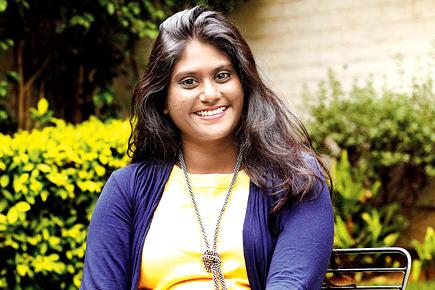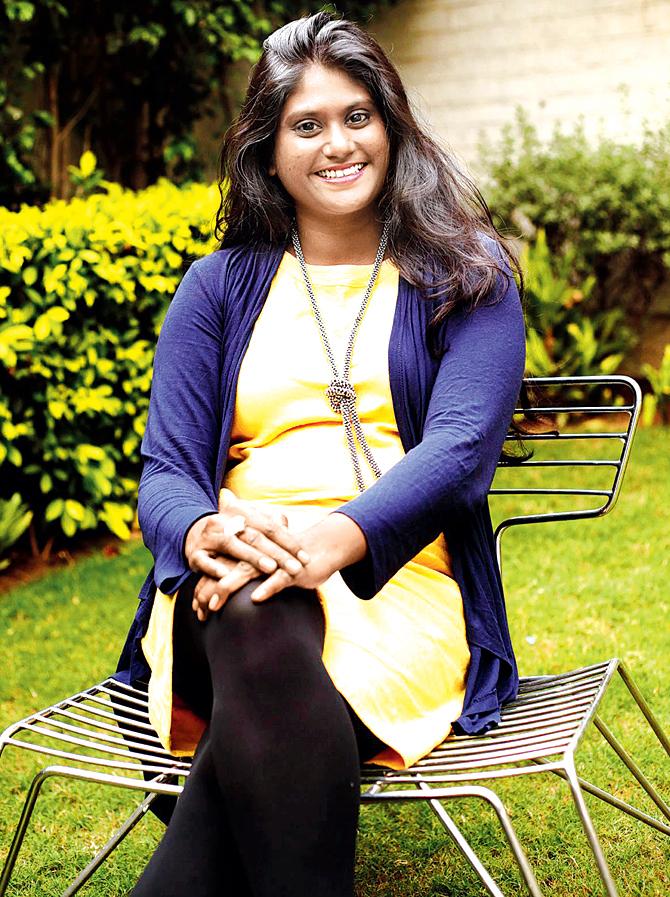Author Rosalyn D'Mello book, A Handbook For My Lover, talks of her love and sex life with a man 30 years her senior

Rosalyn D'Mello
ADVERTISEMENT
A couple of years ago, when she was doing her MA in English Literature from Jawaharlal Nehru University, 30-year-old writer Rosalyn D’Mello spoke to her professor about writing about the body and the reactions it can draw from people around you, especially family. "If you are going to worry about what your parents are going to say, you have no business writing," he told her. Still young and raw, D'Mello at the time was just starting to discover her style and had only ventured into the territory of erotica. Her book, A Handbook For My Lover, that’s releasing next month, is a non-fiction erotic memoir that continues that trend. "Somehow, what he said stayed with me. It made me feel like I had the courage to be fearless about writing," she smiles. Also the idea of women and "irrepressibility", a word she uses deliberately. Most of her favourite women authors, she shares, are women who can't be repressed. Women who are fearless when it comes to writing about themselves. "They write about shame, they write about their lust and their sheer wanton desire for a man. I say that it’s weirdly empowering if you are able to do that. On the one hand, it is like an act of stripping — internally and externally in front of an audience. Yet, it doesn’t make you feel victimised because you are performing and making a narrative of everything that you experience daily," she explains. "Once you start to document, you have control over your experiences and that control is what makes you empowered." She maintains that erotic writing is not about pornography but about taking charge of the narrative. "For me, that is deeply fascinating."

Pic/Ajay Gautam
This obsession with weaving her own narrative is something she has harboured since she was a child. Growing up in Kurla, she started keeping a journal at age 10. "I always wanted to be a poet. Poetry was my first love," she laughs. She even joined a poetry club in her late teens, with Anuradha Subramanyam and Jerry Pinto but realised it was not for her. "I never read any of my poems out loud, but listening to others was instrumental in my conditioning as a writer." It took her a long time to realise that what she was writing was not poetry. Meanwhile, she immersed herself in literature, reading Shakespeare and being fixated with his sonnets. She also fell in love with Rabindranath Tagore, Mr Darcy and the Bronte sisters. After finishing her undergraduate course at St Xavier’s, she moved to Delhi (JNU) to pursue her MA. This was around the time she first began dabbling in erotic fiction. "It took me a long time to come to terms with the fact that I don’t write fiction, and that I write strongest when I write about the self."
Her erotic fiction coupled with her feminist sensibilities put her on the literary radar much before her book. But it was only when she fell in love with a man 30 years her senior did a solid idea finally emerge. "The relationship was overwhelming for me. We weren’t technically supposed to be in a relationship. But we were falling in love and I wanted to make sense of it."
The photographer gave her a moleskin diary that she was apprehensive to "taint", and he made her a deal — a new diary for each filled. And the book happened, over the course of six years and several diaries, one of which was lost at the Jaipur Literature Festival two years ago. "The idea germinated in my diaries," she says. It is obvious for someone who writes long hand and uses the self as a prism, something like a processing unit that renders experiences into writing. "A lot of it happened over documentation. If he said anything that struck me, I would write it down. I started to arrange it like archives and so it happened in real time." She does confess that when she began writing this she thought she would call it fiction so that she could be honest. "It was only later, when I met my agent, who persuaded me to call it non-fiction. Because really, that is the beauty of it."
Although the book is only releasing later next month, it has garnered much interest due to its subject. It's almost voyeuristic to be able to pick up a book and be privy to the dynamics of a very public, private relationship. Almost like in a tabloid. In this sense, the need for D’Mello to be an authoritarian voice on this narrative is a normal one. An almost powerful one, where not only is she taking charge of the voice and setting the tone but also subverting the idea of the lover and the muse. It is an important book because it is the first of its kind and D’Mello knows that, "It felt like such a cliché to put myself in my first book. But no one had done it before. Plus, I think. it is really about a style of writing that is interesting to me. Perhaps it’s a journey of trying to understand the self. Any artist who creates art and is in the process of it, goes through it."
 Subscribe today by clicking the link and stay updated with the latest news!" Click here!
Subscribe today by clicking the link and stay updated with the latest news!" Click here!







